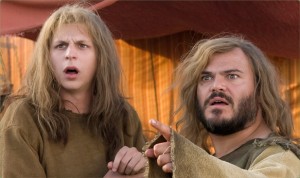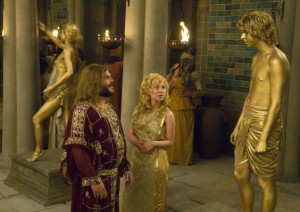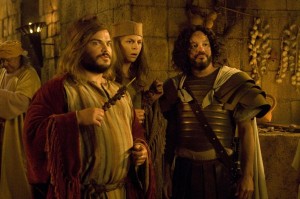Year One
 It doesn’t happen often. But sometimes you can tell how stale and unfunny a comedy is going to be just from the marketing alone. I’m not referring to the TV ads and trailers, which take bits out of context, often changing their meaning and humor value. I mean situations where a cast member shows up on a talk show, with the aim of promoting the movie, and barely mentions the actual film. And he seems none-too enthused when they actually play a clip, which is intended to show a specific moment of excellence by that specific performer.
It doesn’t happen often. But sometimes you can tell how stale and unfunny a comedy is going to be just from the marketing alone. I’m not referring to the TV ads and trailers, which take bits out of context, often changing their meaning and humor value. I mean situations where a cast member shows up on a talk show, with the aim of promoting the movie, and barely mentions the actual film. And he seems none-too enthused when they actually play a clip, which is intended to show a specific moment of excellence by that specific performer.
 That disinterest permeates Year One through and through. The movie has the feeling of a film that the studio, Sony, had no faith in. So they cut it down as short as possible and to a PG-13 so the audience could skew younger for the first weekend before word got out that it was a disaster (much like what Warner did with The Avengers in 1998). Year One is choppy, scattered, and moldy. Scene after scene has no ending. On two separate occasions Michael Cera’s character, Oh, a young man living in the supposed era of the title, is attacked by animals, once with a snake choking him to death and another time when he’s savaged by a cougar, and we don’t see how he gets out of the situation, the film just cuts to later on when he’s somehow escaped. It doesn’t appear to be a joke; indeed there are semblances of the answer in the outtakes during the closing credits, showing his friend in the film, played by Jack Black, as Zed, trying to kill the snake.
That disinterest permeates Year One through and through. The movie has the feeling of a film that the studio, Sony, had no faith in. So they cut it down as short as possible and to a PG-13 so the audience could skew younger for the first weekend before word got out that it was a disaster (much like what Warner did with The Avengers in 1998). Year One is choppy, scattered, and moldy. Scene after scene has no ending. On two separate occasions Michael Cera’s character, Oh, a young man living in the supposed era of the title, is attacked by animals, once with a snake choking him to death and another time when he’s savaged by a cougar, and we don’t see how he gets out of the situation, the film just cuts to later on when he’s somehow escaped. It doesn’t appear to be a joke; indeed there are semblances of the answer in the outtakes during the closing credits, showing his friend in the film, played by Jack Black, as Zed, trying to kill the snake.
 You’d think plot holes wouldn’t be distractions in a lowbrow comedy like Year One, which takes flimsy shots at what it might have been like to live in biblical times. But the ruthless editing has devoured the comedic pacing, eliminating any flow between scenes, which all play like underwritten sketches. The movie Year One most resembles is Mel Brooks’ History of the World: Part I, lots of mugging, lots of notable comics and actors [wasted] in small parts, tons of toilet humor which has nothing to do with the subject matter, cheap gay jokes and mincing stereotypes, an endless array of Jewish jokes and references to how painful circumcision is, and both films are mostly spoken in modern language, as if the juxtaposition alone would be funny. History of the World: Part I had the advantage of actually being vaguely linked sketches, but Year One is just left over material from Ringo Starr’s 1981 movie Caveman* tied together by jumping from Cain and Abel to Abraham and Isaac to Sodom and Gomorrah, all the while Jack Black and Michael Cera try to rescue their enslaved girlfriends. Black’s performance consists of leering lasciviously at women, making lame innuendos, farting, and being the butt of fat jokes. Cera does what he always does, looks uncomfortable (not helped by his silly wig) and mutters one-liners with a lack of assurance, tinged with irony. Bit parts are filled in by David Cross as Cain, Hank Azaria as Abraham, and most embarrassingly, Oliver Platt as an effeminate, hairy priest who likes to have his chest hair oiled up and wears a lot of ridiculous facial make-up. The only interesting thing that amounts from all these actors is that Platt appears to be channeling Family Guy’s Stewie Griffin with his voice, not that it adds anything to his lines.
You’d think plot holes wouldn’t be distractions in a lowbrow comedy like Year One, which takes flimsy shots at what it might have been like to live in biblical times. But the ruthless editing has devoured the comedic pacing, eliminating any flow between scenes, which all play like underwritten sketches. The movie Year One most resembles is Mel Brooks’ History of the World: Part I, lots of mugging, lots of notable comics and actors [wasted] in small parts, tons of toilet humor which has nothing to do with the subject matter, cheap gay jokes and mincing stereotypes, an endless array of Jewish jokes and references to how painful circumcision is, and both films are mostly spoken in modern language, as if the juxtaposition alone would be funny. History of the World: Part I had the advantage of actually being vaguely linked sketches, but Year One is just left over material from Ringo Starr’s 1981 movie Caveman* tied together by jumping from Cain and Abel to Abraham and Isaac to Sodom and Gomorrah, all the while Jack Black and Michael Cera try to rescue their enslaved girlfriends. Black’s performance consists of leering lasciviously at women, making lame innuendos, farting, and being the butt of fat jokes. Cera does what he always does, looks uncomfortable (not helped by his silly wig) and mutters one-liners with a lack of assurance, tinged with irony. Bit parts are filled in by David Cross as Cain, Hank Azaria as Abraham, and most embarrassingly, Oliver Platt as an effeminate, hairy priest who likes to have his chest hair oiled up and wears a lot of ridiculous facial make-up. The only interesting thing that amounts from all these actors is that Platt appears to be channeling Family Guy’s Stewie Griffin with his voice, not that it adds anything to his lines.
 Ramis may have been cajoled into dumbing down his script to include scenes where Black eats poop and Cera pees on his own face, and a funny pastiche could be made mocking the Bible. But Year One, unlike Brooks’ style, is not pastiche; it is just tepid sex jokes without payoffs. Even the occasionally half-way clever line (“I’m a virgin by choice.” “Not your choice.”) is nullified by ten minutes of watching David Cross beating Paul Rudd over the head with a rock. No doubt Ramis wished he’d taken Rudd’s part instead.
Ramis may have been cajoled into dumbing down his script to include scenes where Black eats poop and Cera pees on his own face, and a funny pastiche could be made mocking the Bible. But Year One, unlike Brooks’ style, is not pastiche; it is just tepid sex jokes without payoffs. Even the occasionally half-way clever line (“I’m a virgin by choice.” “Not your choice.”) is nullified by ten minutes of watching David Cross beating Paul Rudd over the head with a rock. No doubt Ramis wished he’d taken Rudd’s part instead.
* It is not much of a shock that Caveman was co-written by Mel Brooks’ frequent writing partner Rudy De Luca.
** It should be even less of a shock that Year One was rumored to be written by Ramis 30 years ago and he simply dusted it off and added a few contemporary references.



